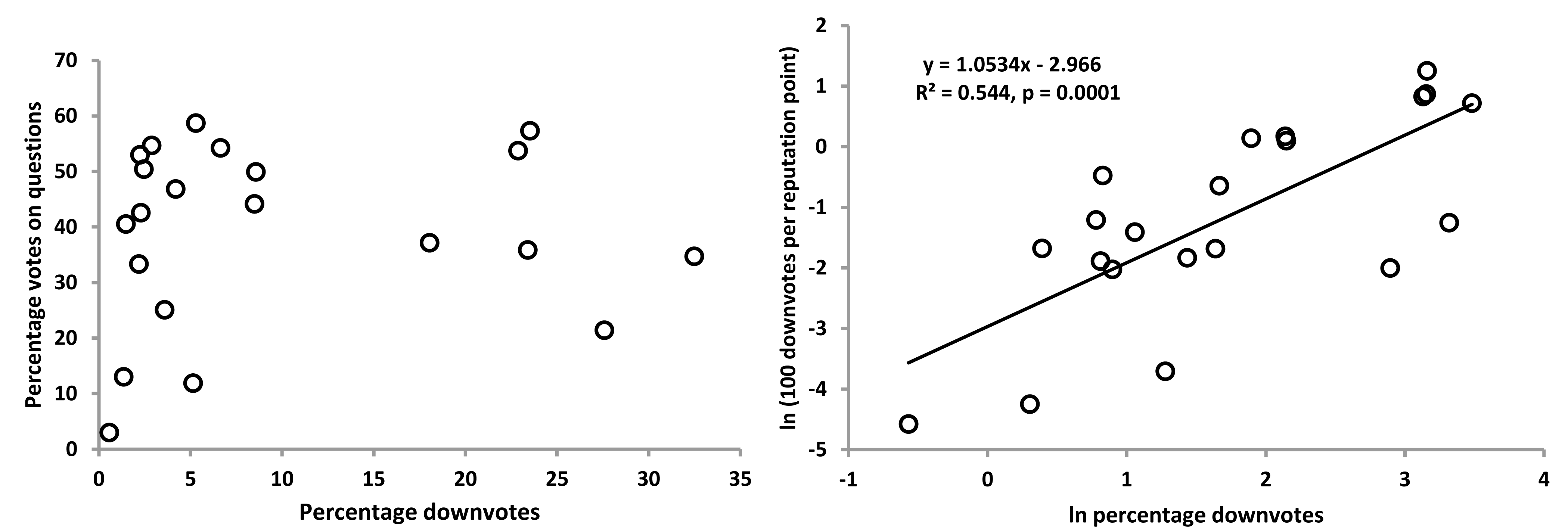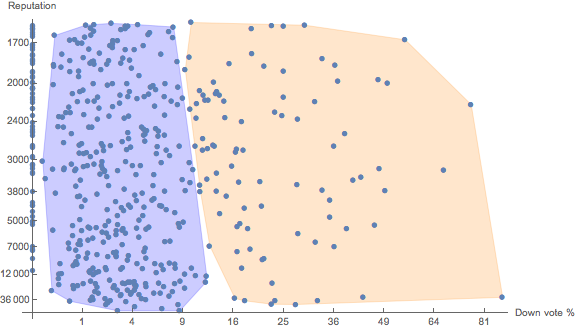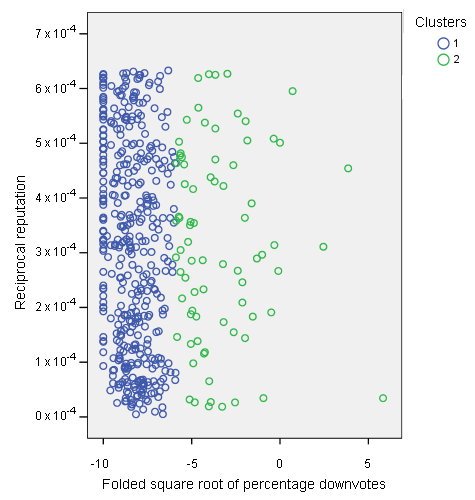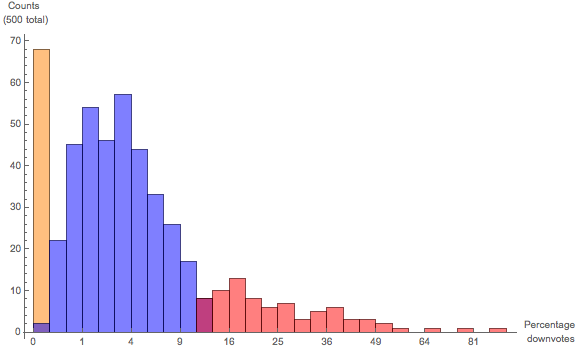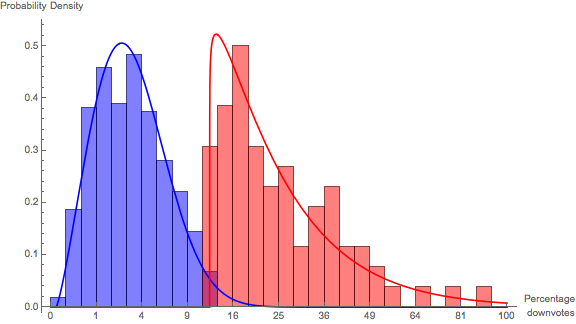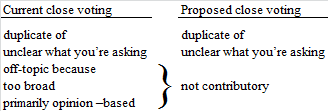Note the approximately equal opinions +16/-13 on this question. Clearly, this question divides our site members into approximately equal groups of opinions for downvoting. To those who would prefer a different tenor for the text of the question, please note that democracy is supposed to bring up issues worth discussing, which is not the same as having everyone agree about everything. Surely there are users who do not feel that downvoting is broken. Those users surely would not object to tweaking downvoting with clearly better alternatives to better serve those of us who do feel it is broken.
It has been my experience on multiple answers and even on closure votes on questions that unreasonable downvoting occurs like a flock of geese landing on a pond, more of a follow-the-leader activity, as contrasted to independent, original, individual thought.
Sometimes, on our site, this crowd behavior occurs because of a word that means one thing to a statistician and something else to many other specialists. Sometimes this occurs because a minor error is committed, and even when it is corrected, the downvotes remain.
When something that is just too original a thought is being developed, and the readers are guiding the development of that thought, progress is being made. This is usually downvoted, it generates interest, draws readers to that question, and usually rewards some other answer of a more conventional, boring, and incomplete type that "fits" within the scope of the average reader's training.
This is hardly the first time this phenomenon has been noted (e.g.: see here and here).
What can we do to discourage the bandwagon effect in CV SE?
- Should we limit the number of downvotes to one per day until the user reputation is greater than 1000?
- Should we increase the +125 reputation needed for first downvoting?
- Should we add a decision tree for downvoting like we have for flagging or close voting?
- Should we modify close voting to shift some down votes to close votes?
Your thoughts, as usual are welcome. Here is another example, view it soon as these things change when attention is called to them.
Edit:
Can we do something about this problem to make downvoting more useful?
Here are some new suggestions:
- We might require commenting for downvoting but include the option for making that comment anonymous. The motive for this would be to prevent the fear of retaliation to the downvoter, while enabling the downvoter to contribute.
- We might allow the downvoter to be notified when the answer is changed, so that the downvoter has the option of regaining his(her) +2 when the perceived problem (real problems or or even a misunderstanding of the downvoter) has been addressed by changing the content of the post.
In the final analysis, downvoting fulfills a role, the question here is whether we can improve that role for everyone's sake.
Here is another example of downvoting that makes no sense, that is off topic and is reminiscent of bower-birds collecting shiny objects as part of their mating ritual.
Yet another example of nasty negative reactions. The users spent all of their time and reputation points criticizing both the question, which is now on hold, and which was naive but not ridiculous. Lots of comments on how ridiculous the question is, but no downvotes. There was even a comment about the comments that no one bothered to answer the question. Enter moi into this regurgitation of furballs, and whatever I wrote got more downvotes. Meritorious? @gung didn't think so. What is a new user to think of this nonsense? The only person who bothered to try to help rather than spew negativity got clobbered for his efforts.
EDIT on 2018-10-21 Yet another suggestion, bear with me on this. Let's make a point with some quick and dirty pseudo-science...
The graph on the left is from users with mostly very high reputations. It shows two fairly obvious clusters. The left-hand group has a wider range of percentages of question votes versus total votes, and a low percentage (<9%) of downvotes. Let's call this group 'softies.' The right hand group in this left sided figure are the 'tough-guys' they tend to downvote much more frequently (>18%). Without being totally scientific about it, the fact that there is a clear distinction between these groups (with no values between 9% and 18%) suggests to us that we users, even the highest reputation rollers we have, have inconsistent approaches to downvoting. Next, let us look search for why this is. The figure to the right shows a crude 'information content' analysis. Don't fret, I am not trying for plu-perfect stats here. It shows that there is a significant correlation between log-downvotes per reputation point and log-percentage downvotes. Sure, this correlation is not very explanatory, but note that the clustering has disappeared. I think, and do correct me if I am wrong, that this suggests that those who more readily express negative information content (opinions) do so as a relatively increased percentage of their opinions.
Now, what does this mean? For one thing, from the viewpoint of recipients of these votes, inconsistent, i.e., erratic, downvoting is problematic. That is, it more depends on who is reviewing what than what is being reviewed. If you get a softie rather than a tough-guy as a first voter, you are in luck.
Finally, the new suggestion. We could make participation badges for kind-hearted behaviour. For example, less than 10% downvotes for 400 votes (bronze), 1000 votes (silver) and 4,000 votes (gold). This might give users a motive for not being hypercritical and help balance out the perception of arbitrarily hypercritical reactions to posts. I noted unscientifically while doing this 'pseudo-analysis' that the user self-descriptions that were the most 'in your face' belonged to the most negative reviewers, and that the emotionally mature reviewers and those who said squat about themselves, tended to be kind-hearted. Some useful advice: If you have to take an oral examination, and you have a choice between having a new, unsure of themselves, assistant professor and an aging professor who has 'seen it all' examine you, take the old fart, you are more likely to be treated fairly.
Edit 2018-11-01 Just to be clear, I am trying to be helpful. There are problems with downvoting and I am trying to be helpful. Example, this post of mine was finally deleted: https://meta.stackexchange.com/questions/316262/can-we-figure-out-a-way-to-pay-moderators. That occurred following -20 votes from what appear to be accolades of the status quo. Next, is an example of unexplained downvoting for a reasonable question. The answer to that question appears to be that current notation is elliptical enough that a "+" sign between random variables does not indicate whether those are paired outcomes or single outcomes, i.e., whether in the first case, convolution is invoked or in the second case, single outcomes, arithmetic addition is invoked. Regardless, the question continues to receive downvotes (now +16/-5). Would someone care to explain what the root of the -5 votes can be attributed to? (BTW, this is a Famous Question, i.e., 10,000+ visits. But, I finally managed to figure out why someone might down vote it; the question language was informal. I then posited the question more exactly, (only) one downvote disappeared, and several up votes were added in a sort time. So it can matter how one asks a question more than what the question actually is.)
What is occurring in society at large, e.g., political correctness amounting to slander and politically motivated violence, has an effect on our site. For example, this has impacted our site with the institution of politically correct (PC) commenting lest someone be offended, which PC answers are generally twice as long as the more curt versions. Weaponized downvoting is currently poorly controlled, and may become increasingly problematic with time. In searching my own behaviour, I cannot see an altruistic motive for downvoting; something else negative always predominates whether that be strategic downvoting on competitive and incorrect answers, or whatever.
I for one am swearing off of downvoting, take that pledge with me.

